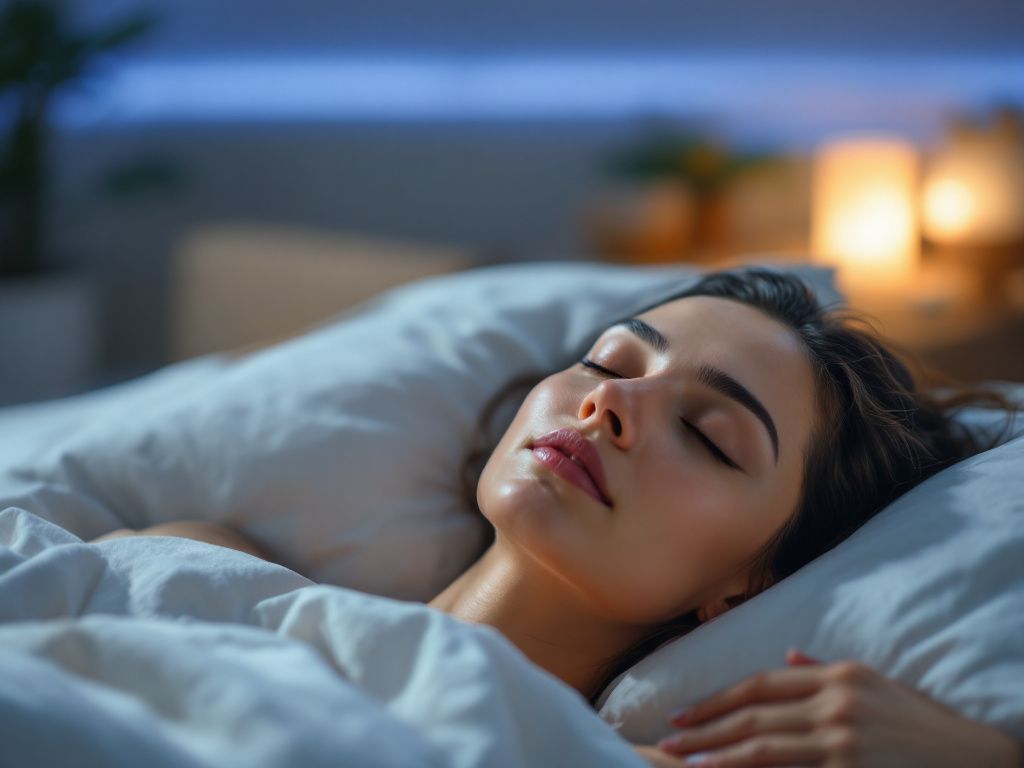Hey friend! So, let’s dive into a topic that’s near and dear to a lot of us: sleep, or rather, the strange dance it does with our skin. You know that morning when you wake up, finally feeling refreshed, only to see a nasty surprise blooming on your otherwise peaceful face? Ugh, we’ve all been there, right?
I know it can feel a little unfair. You finally manage to catch more than a handful of z’s, but then bam, acne decides to crash the party. It’s one of those pesky life mysteries we need to unravel, not just for clearer skin but for some genuine peace of mind. So, let’s chat about how sleep quality—yep, just simple ol’ sleep—impacts our skin, specifically the rest effects on acne.
Table of Contents
ToggleWhy Sleep is a Big Deal for Your Skin
Let’s get one thing straight from the get-go: sleep isn’t just a clock-resetting affair. It’s a full-blown body maintenance ritual. Think of it as when your phone takes that mandatory update. All the things you’re usually too busy—or too awake—to process, your body handles them while you’re catching some shuteye. Pretty neat, huh?
The skin, being the largest organ of the body, joins this nocturnal repair party. While your mind dreams of magical cupcakes or endless beaches, your skin gets busy repairing itself, and that’s heavily dependent on, you guessed it, the quality of sleep. When your sleep quality isn’t up to par, your skin doesn’t quite make it to the finish line of its nocturnal tasks.
The Science-y Bit
When we’re in a deep slumber, our bodies release a bunch of stuff that’s fantastic for repair and rejuvenation—like growth hormones. These little developers play a huge role in skin cell regeneration. Poor sleep equals less of these miraculous hormones, leading to slower recovery from acne breakouts, or worse, more frequent visits from these uninvited guests.
The Connection: Sleep Quality Impact on Acne
Here’s where things get real interesting. When we consistently nab quality sleep, our stress levels do a wonky little dance, taking a comfortable drop. When you slack on sleep, your body can up the ante with cortisol—the stress hormone. Studies suggest that heightened cortisol levels stir up inflammatory responses, triggering those pesky breakouts.
Digesting Cortisol’s Role

Cortisol isn’t a demon—it’s really critical in small amounts. But mess with your circadian rhythm—the body’s internal clock—and the overdrive might send your sebaceous glands into hyper-production mode, meaning more oil and, consequently, more acne. A nightmare for anyone navigating teenage years or hormonal changes.
Here’s a crazy idea: even the most meticulous night care routines can get scuttled when poor sleep becomes the default. If we aren’t dreaming beautiful dreams with sufficient sleep quality, our bodies might just act out in tiredness.
How Rest Effects Your Skincare Battle Plan
**Let’s talk about winding down.** Having a ritual before bed is like giving your body a map straight to restful, beautiful sleep. A lot of folks, myself included, might just roll into the covers without much thought, hoping sleep takes over. But as it turns out, having some sort of bedtime routine can hugely benefit those needing clarity in the acne domain.
Sticking to Bedtime Hygiene
How about setting a cool-down period an hour before you sleep? Trust me on this: flick off your electronics, dim those lights, and maybe read that book you’ve been putting off for far too long. These tiny changes signal your body—it’s time to “rest” and rejuvenate.
Dress Code for Rest
While we’re figuring out our nighttime ritual, let’s not forget what we wrap ourselves in. Breathable, clean bedding matters. When possible, natural fibers reduce irritants, making it easier for your skin to fight the good fight while you dream away. Neat, right?
Now, night care: consider layering a hyaluronic acid serum or a night mask after moisturizing. Not only do they hydrate, but they play goalkeeper, defending against potential breakouts overnight as you rest.
Sleep Quality Isn’t Just About the Amount
**Let’s untangle this myth that’s done too much damage:** Sleep hours don’t tell the whole story. The quality of your sleep determines if those eight hours hit the team of productivity or just idling away in a snore-fest (not the fun kind).
Assess Your Habitat

Okay, this one might blow your mind! Minimal changes in your surroundings can uplift your mood and your skin. A cool, quiet environment or the increasing popularity of white-noise machines can, believe me, make your sleep investment long-term.
The Big Three:
- Pillow Talk: Lift your head via an extra pillow—it improves airflow, minimizing those suffocating hours which lead to potential puffiness and acne.
- Curtail Interruptions: Let your sleep remain uninterrupted by managing your liquid intake. Late-night water chugging can send you on repeated bathroom voyages. Take it from someone who has propped open many a dry eyelid too early.
- Consistency in Sleep Timing: I admit, sticking to a consistent sleep schedule over the weekend can give your body the purpose it needs to stay regular. It’s one of those quiet guardians against future skirmishes.
The Self-Care Conundrum: Beyond Just Sleep
Once you open those eyes post-nighttime repair session, forming habits for the day make all the difference in your wellness and skin quality. This is where the true challenge lies.
Morning Reminders
- Kickstart with Hydration: Before reaching for the caffeine, down a glass of water. Starting your day hydrated gives you a better shot at fortifying your defenses—inside and out.
- Gentle Cleanser: Use a mild cleanser that respects your skin’s delicate state after it completed an entire night shift on renewal duty.
- Bust the Stress: Quick morning exercise or breathing routine can keep cortisol at bay. Plus, those post-endurance endorphins are like mother nature’s lullabies battling acne.
Navigating Nutrition

Steer your daily diet into a diverse landscape rich in omega-3, veggies, and lessen those processed nudgeables. Feeding your skin from the inside can only enhance the renovations you’re enjoying while snoozing.
Tying up (and Illuminating) The Causes
**Okay, here’s the golden nugget:** Embrace this cycle—more committed and better sleep steers you clear of acne breakers. It feeds into an everyday vibrancy evident in not just your renewals and reflections, but the long-haul confidence.
Sure, it’s interesting how quality rest effects cut across the broader eczema and inflammation spectrum in skin deep battles. Through tapping into wellness focus and saying goodbye to restless nights, we channel towards an ecosystem of skin harmony.
Key Takeaways to Ponder
- Prioritize Sleep: Understand the benefits deep sleep returns—you’re ensuring stress stays low and repair systems reign.
- Cortisol in Check: Give back control by rejuvenating in sync with your natural rhythm—those inflammatory myth busters need disciplined consistency.
- Cultivate the Environment: Be meticulous about your habitat. Comfort and clean living, from air filters to pillowcases, counts significantly on the road to skin health.
Concluding Thoughts
Troubling acne doesn’t stand a chance once your nights incorporate quality sleep. Building from minimal tweaks encourages your wellness guide to glow naturally. Isn’t that worth a shift to cozy boudoir adventures enabling unbroken transformations?
Let’s see those alarm sittings evolve into conversations! Lights out, skin harmony in. This, dear friend, signals time for your leap of clarity in dreamland.
Frequently Asked Questions
How does the physical environment impact sleep quality?
The physical environment, including factors such as urban density, exposure to artificial light, noise pollution, and air quality, can significantly impact sleep quality. For instance, exposure to artificial light at night can suppress melatonin secretion and delay sleep onset. Additionally, air pollution has been linked to sleep apnea and poorer sleep quality due to its effects on the upper airway[1][3].
What role does the social environment play in sleep quality?
The social environment, including aspects such as neighborhood safety, social cohesion, and stigma, can influence sleep health. For example, living in areas with high crime rates or social disorder can lead to increased stress and poorer sleep quality. The social environment can contribute to allostatic load and physiological stress responses, which in turn can negatively affect sleep[1].
How do environmental pollutants affect sleep quality?
Environmental pollutants such as heavy metals (e.g., lead, mercury, cadmium), pesticides, and air pollutants (e.g., nitrogen dioxide, fine particulate matter) can adversely affect sleep quality. These pollutants can lead to sleep disturbances, insomnia, and other sleep disorders by affecting neurotransmitters and causing inflammation in the upper airway[3].
What are some common factors that affect sleep quality in daily life?
Common factors that affect sleep quality include irregular sleep schedules, a poor sleeping environment (e.g., excessive light, noise), consumption of caffeine or alcohol, certain prescription drugs, and lifestyle factors such as diet, stress, and exercise. Additionally, sleep disorders like insomnia and obstructive sleep apnea can significantly impact sleep quality[4].
References







